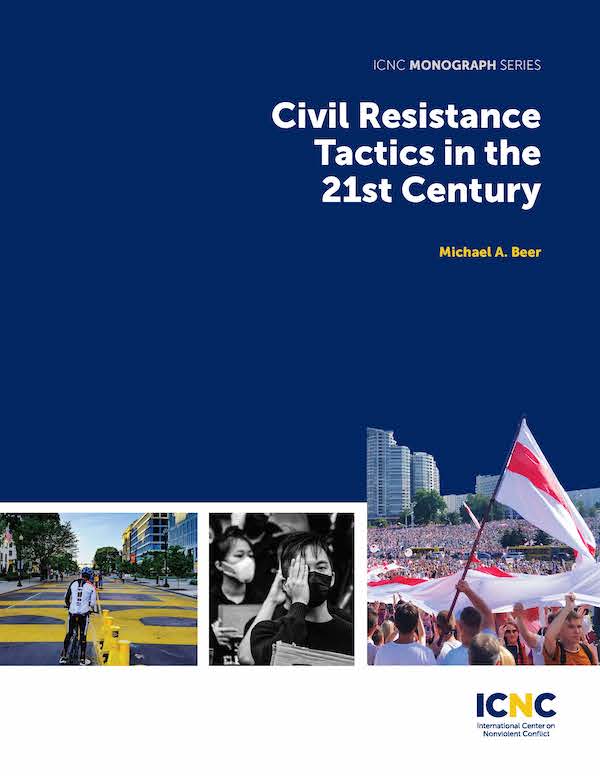by author Michael Beer
and with discussants Dr. Peter Ackerman and Shaazka Beyerle
Wednesday, March 31, 2021
Webinar Content:
Introduction of Speaker: 0:00 – 4:12
Presentation: 4:13 – 29:00
Responses from Discussants: 29:01 – 53:35
Questions & Answers: 53:36 – 1:26:56
Webinar Description:
 In this webinar Michael Beer discusses his new monograph, Civil Resistance Tactics in the 21st Century. This new publication from ICNC Press adds new methods of nonviolent action to the list of 198 methods categorized by Gene Sharp in 1973 in his book, The Methods of Nonviolent Action. This monograph inspires readers that nonviolent action encompasses a big category of human activity and that new and old tactics are employed daily. It also analyzes strengths and weaknesses of Dr. Sharp’s typologies and updates his work by documenting additional methods of nonviolent action and new scholarship from the fields of civil resistance, human rights defense, and social change.
In this webinar Michael Beer discusses his new monograph, Civil Resistance Tactics in the 21st Century. This new publication from ICNC Press adds new methods of nonviolent action to the list of 198 methods categorized by Gene Sharp in 1973 in his book, The Methods of Nonviolent Action. This monograph inspires readers that nonviolent action encompasses a big category of human activity and that new and old tactics are employed daily. It also analyzes strengths and weaknesses of Dr. Sharp’s typologies and updates his work by documenting additional methods of nonviolent action and new scholarship from the fields of civil resistance, human rights defense, and social change.
In this webinar, Michael Beer surveys the work of scholars and activists who have contributed alternative nonviolent typologies and who have gathered, organized and added to Dr. Sharp’s list of nonviolent methods. Beer discusses undiscovered methods and propose helpful new categories of nonviolent action. Further, he summarizes lessons learned and how they are relevant for practitioners, educators, and scholars of civil resistance.
Michael Beer’s presentation is followed by a discussion with Shaazka Beyerle, Senior Fellow at the Terrorism, Transnational Crime and Corruption Center, and Dr. Peter Ackerman, Founding Chair of ICNC.
About the Monograph:
Civil Resistance Tactics in the 21st Century belongs on the virtual bookshelf of anyone who is studying or practicing nonviolent action.
For scholars of civil resistance: This monograph updates Gene Sharp’s 1973 seminal work Methods of Nonviolent Action, reworking Sharp’s classifications to include 148 additional tactics (methods).
For trainers and teachers: Brief yet comprehensive, this overview of nonviolence explains the mechanisms by which nonviolent actions succeed and allows students to differentiate the immense field of nonviolent action from institutionalized lobbying, electioneering, legal fights, and armed conflict.
For activists: This resource, in conjunction with Nonviolence International’s voluminous Nonviolent Tactics Database and Organizing & Training Archive, enlarges the activist toolbox and focuses on the central role of tactics in organizing strategic campaigns for success and power.
This monograph will serve as a foundational text not only “in the field” of action, but also in classrooms studying nonviolent action, civil resistance, peacebuilding, and creative conflict resolution around the world.
About the Presenter:
 Michael Beer serves as the Director of Nonviolence International, an innovative and respected Washington DC based nonprofit promoting nonviolent approaches to international conflicts. Since 1991 he has worked with NVI to serve marginalized people who seek to use nonviolent tactics often in difficult and dangerous environments. This includes diaspora activists, multinational coalitions, global social movements, as well as within countries including: Myanmar, Tibet, Indonesia, Russia, Thailand, Palestine, Cambodia, East Timor, Iran, India, Kosovo, Zimbabwe, Sudan, and the United States. Michael Beer has a special expertise in supporting movements against dictators and in support of global organizing for justice, environment, and peace. Michael co-parents two teenagers with his patient life partner, Latanja.
Michael Beer serves as the Director of Nonviolence International, an innovative and respected Washington DC based nonprofit promoting nonviolent approaches to international conflicts. Since 1991 he has worked with NVI to serve marginalized people who seek to use nonviolent tactics often in difficult and dangerous environments. This includes diaspora activists, multinational coalitions, global social movements, as well as within countries including: Myanmar, Tibet, Indonesia, Russia, Thailand, Palestine, Cambodia, East Timor, Iran, India, Kosovo, Zimbabwe, Sudan, and the United States. Michael Beer has a special expertise in supporting movements against dictators and in support of global organizing for justice, environment, and peace. Michael co-parents two teenagers with his patient life partner, Latanja.
About the Discussants
 Dr. Peter Ackerman is the Founding Chair of ICNC, and one of the world’s leading authorities on nonviolent conflict. He holds a Ph.D. from The Fletcher School, Tufts University, and is also co-author of two seminal books on nonviolent resistance, A Force More Powerful: A Century of Nonviolent Conflict (Palgrave/St. Martin’s Press, 2001) and Strategic Nonviolent Conflict: The Dynamics of People Power in the Twentieth Century (Praeger, 1994). Dr. Ackerman was the Executive Producer of the PBS-TV documentary, Bringing Down a Dictator, on the fall of Serbian dictator Slobodan Milosevic. It received a 2003 Peabody Award and the 2002 ABC News VideoSource Award of the International Documentary Association.
Dr. Peter Ackerman is the Founding Chair of ICNC, and one of the world’s leading authorities on nonviolent conflict. He holds a Ph.D. from The Fletcher School, Tufts University, and is also co-author of two seminal books on nonviolent resistance, A Force More Powerful: A Century of Nonviolent Conflict (Palgrave/St. Martin’s Press, 2001) and Strategic Nonviolent Conflict: The Dynamics of People Power in the Twentieth Century (Praeger, 1994). Dr. Ackerman was the Executive Producer of the PBS-TV documentary, Bringing Down a Dictator, on the fall of Serbian dictator Slobodan Milosevic. It received a 2003 Peabody Award and the 2002 ABC News VideoSource Award of the International Documentary Association.
In addition, Dr. Ackerman serves as co-chair of the International Advisory Committee of the United States Institute of Peace. He also serves on the Executive Committee of the Board of the Atlantic Council and is a member of the United States Paralympic Advisory Committee. Dr. Ackerman also served on the boards of CARE and the Council of Foreign Relations. He was for 15 years chairman of The Fletcher School Board of Overseers. Read more about Dr. Ackerman.
 Shaazka Beyerle is Senior Fellow at the Terrorism, Transnational Crime and Corruption Center (TraCCC), Schar School of Public Policy and Government, George Mason University. She’s a researcher, writer and educator in nonviolent action, focusing on anti-corruption and accountability (including linkages to governance, development, and violent conflict), as well as gender and nonviolent action. She was previously a Senior Research Advisor and Jennings Randolph Senior Fellow, Program on Nonviolent Action, U.S. Institute of Peace, and is the author of Curtailing Corruption: People Power for Accountability and Justice. She was the lead researcher for a World Bank-Nordic Trust Fund project and co-author of the subsequent report, “Citizens as Drivers of Change: Practicing Human Rights to Engage with the State and Promote Transparency and Accountability.” She teaches and speaks at conferences, workshops and webinars, such as the Global Partnership for Social Accountability and International Anti-Corruption Conferences. She’s an elected member of the UNCAC Coalition Coordination Committee. @go_peoplepower
Shaazka Beyerle is Senior Fellow at the Terrorism, Transnational Crime and Corruption Center (TraCCC), Schar School of Public Policy and Government, George Mason University. She’s a researcher, writer and educator in nonviolent action, focusing on anti-corruption and accountability (including linkages to governance, development, and violent conflict), as well as gender and nonviolent action. She was previously a Senior Research Advisor and Jennings Randolph Senior Fellow, Program on Nonviolent Action, U.S. Institute of Peace, and is the author of Curtailing Corruption: People Power for Accountability and Justice. She was the lead researcher for a World Bank-Nordic Trust Fund project and co-author of the subsequent report, “Citizens as Drivers of Change: Practicing Human Rights to Engage with the State and Promote Transparency and Accountability.” She teaches and speaks at conferences, workshops and webinars, such as the Global Partnership for Social Accountability and International Anti-Corruption Conferences. She’s an elected member of the UNCAC Coalition Coordination Committee. @go_peoplepower
Recommended Readings
“The Need for New Tactics” by Douglas A. Johnson
New Tactics in Human Rights: A Resource for Practitioners by The Center for Victims of Torture
“The Dissident’s Toolkit” by Erica Chenoweth
“The Checklist for Ending Tyranny” by Peter Ackerman and Hardy Merriman
“The Trifecta of Civil Resistance: Unity, Planning, Discipline” by Hardy Merriman